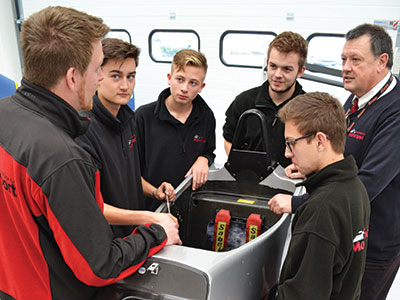Unless there’s the space for young people to transfer the skills they learn onto another route, we risk locking them into careers they no longer want to follow, writes Julie Hyde
With just under a week to go until the Institute for Apprenticeships closes its consultation on the occupational maps for the new T-levels, there are many problems that need to be addressed.
Some are basic errors and easy to fix, but others are larger structural problems requiring thought, which I hope organisations across the sector will highlight in their responses, and decision-makers will recognise.
The maps set out the skilled occupations in the 15 new vocational education routes. Each map has pathways for possible career progression, and clusters that group together occupations with similar training requirements: shared skills, knowledge or behaviours. The core content of T-levels will be based on the chosen route and pathway, with more specialised content based on the specific occupation.
These maps will form the basis for a “coherent curriculum” and are designed to offer clear and credible routes into employment. However, as they stand, they demonstrate a lack of understanding of the occupations they cover, and the realities for young people making decisions about future careers.
How many of us are in exactly the job that we thought we would end up in at 16?
It is vital that the new qualifications have flexibility built in, and are portable. This is particularly evident in our specialist areas: education and childcare, and health and social care. In the current system, many learners start down one of these routes and end up choosing a career in another. Crucially, they can do so without having to start from scratch.
The routes do not divide as neatly in practice as they will in the new system. Occupations in these sectors require many of the same skills and attract similar personalities and learners, who know they want to work in a caring profession, but may not know exactly where their strengths and interests lie.
If the qualifications are not portable from day one, we risk closing options off – and choices made at 16 could limit career options long term. We are in danger of oversimplifying the system and forcing learners to specialise too early on.
This is unlikely to be a recipe for success. How many of us are in exactly the job that we thought we would end up in at 16? Can we really expect a 16-year-old who has an interest in working in the care sector to know confidently that they want to work with adults in a social care setting until they have experienced the work first-hand?
We know that many of our learners currently move freely between childcare, education, health, and adult social care, as their interests and priorities change.
This is important to ensure that they find a career that suits them and gives them job satisfaction – which in turn is vital to delivering the skilled, motivated workforce that these sectors require.
Under the current proposals, the social care route would be apprenticeship only, arguably a mistake.
Many of the qualifications that learners currently take to pursue occupations within the route are delivered successfully in classroom settings and there is no reason that a credible T-level route cannot be created – either as a distinct path or within the health and science route. After all, integrating health and social care is also a government priority, and the workforce is crucial to delivering this shift and will need transferable skills to make it work.
This would also allow learners to choose the mode of learning that suits them best, ensuring that they have a better chance of completing the qualification and succeeding.
If the new system does not work for learners in practice, it will ultimately fail to deliver for employers. It is vital that decision-makers ensure that learners’ needs and experiences are taken into account. We need the system to be flexible enough to allow young people to find the right path, otherwise some will fall through the cracks, and the government’s ambition to create world-class vocational education will flounder.
Julie Hyde is associate director of CACHE



